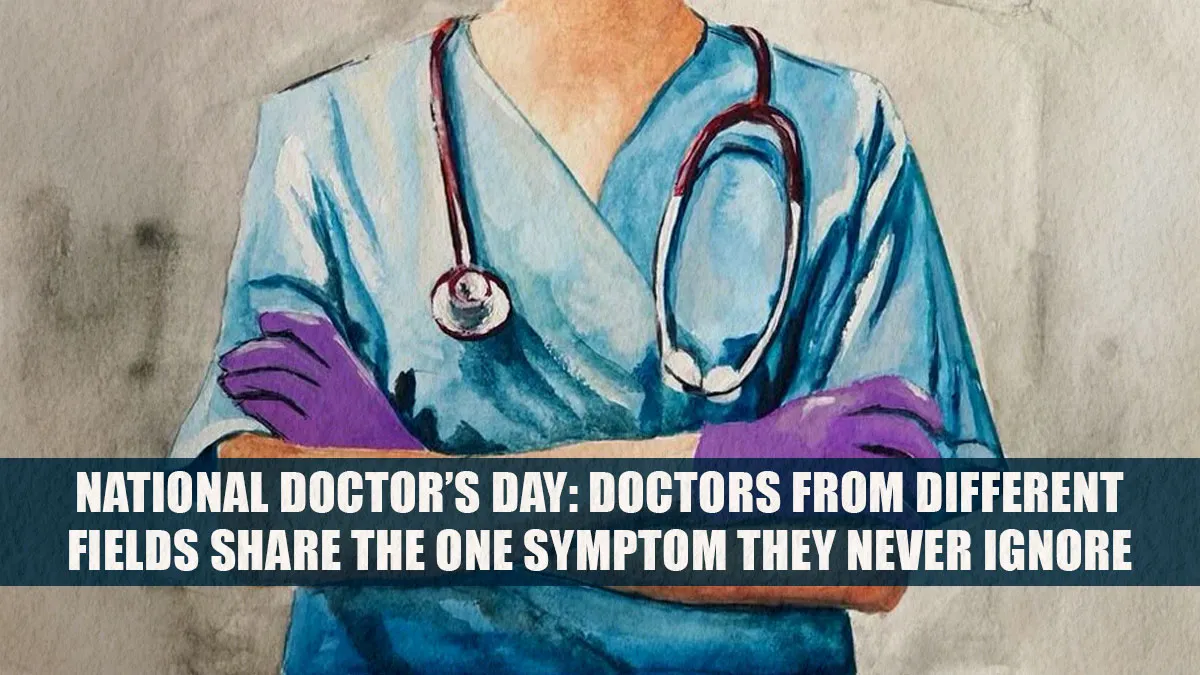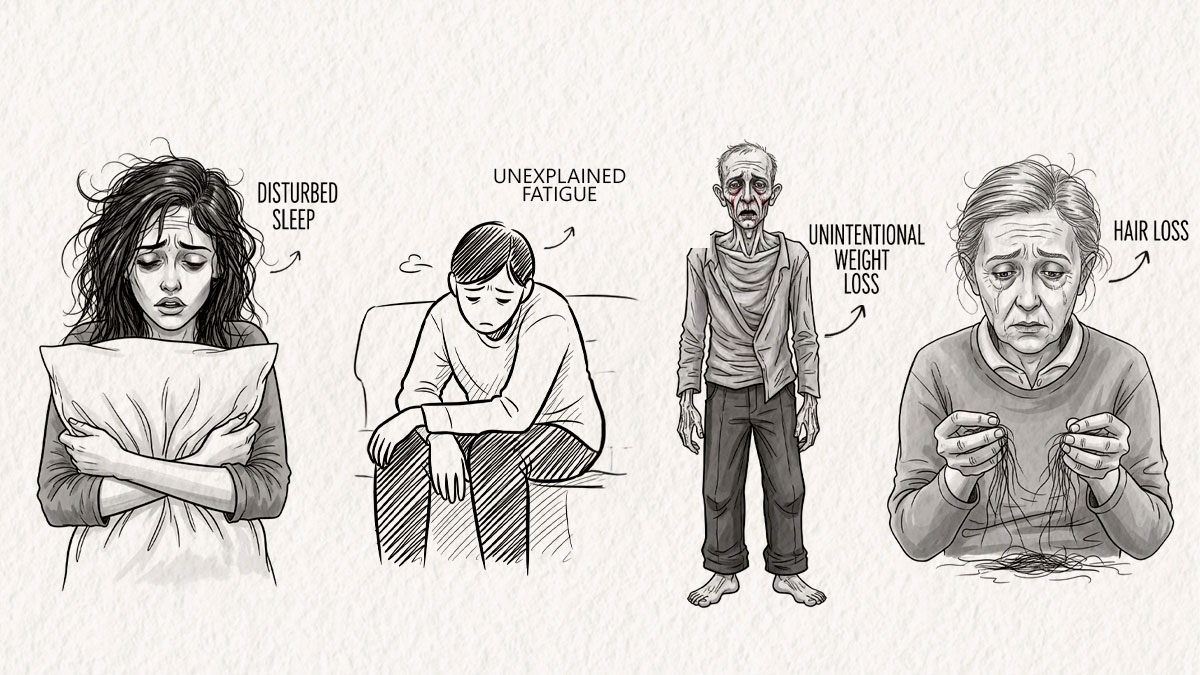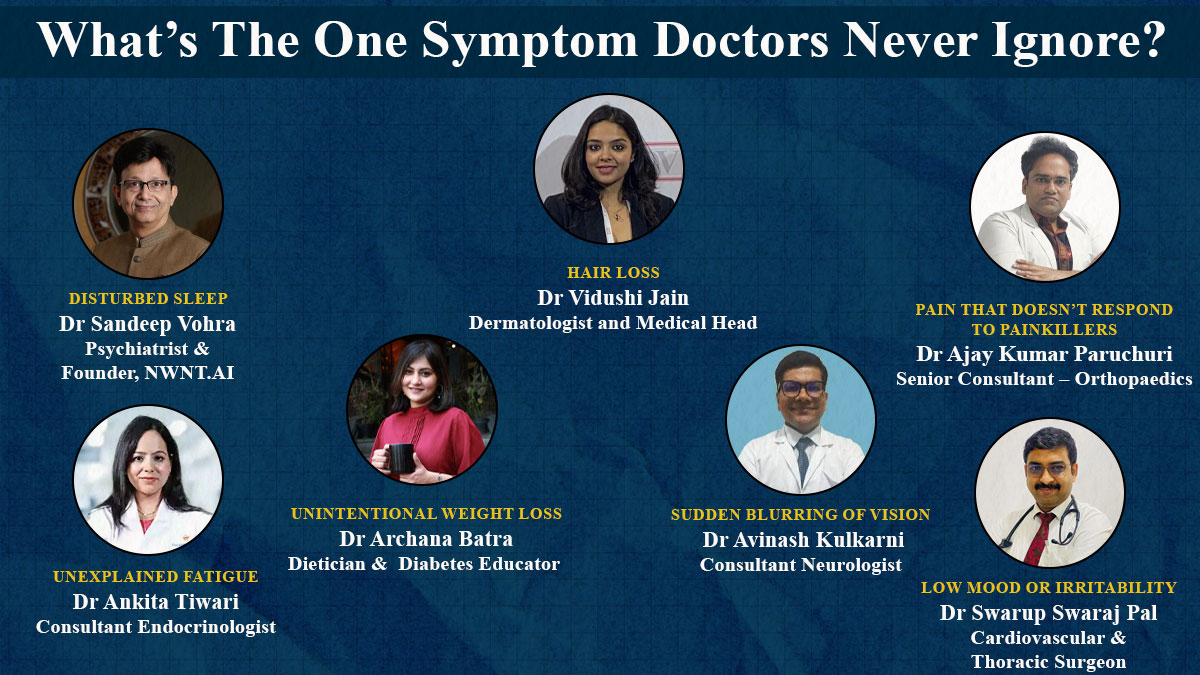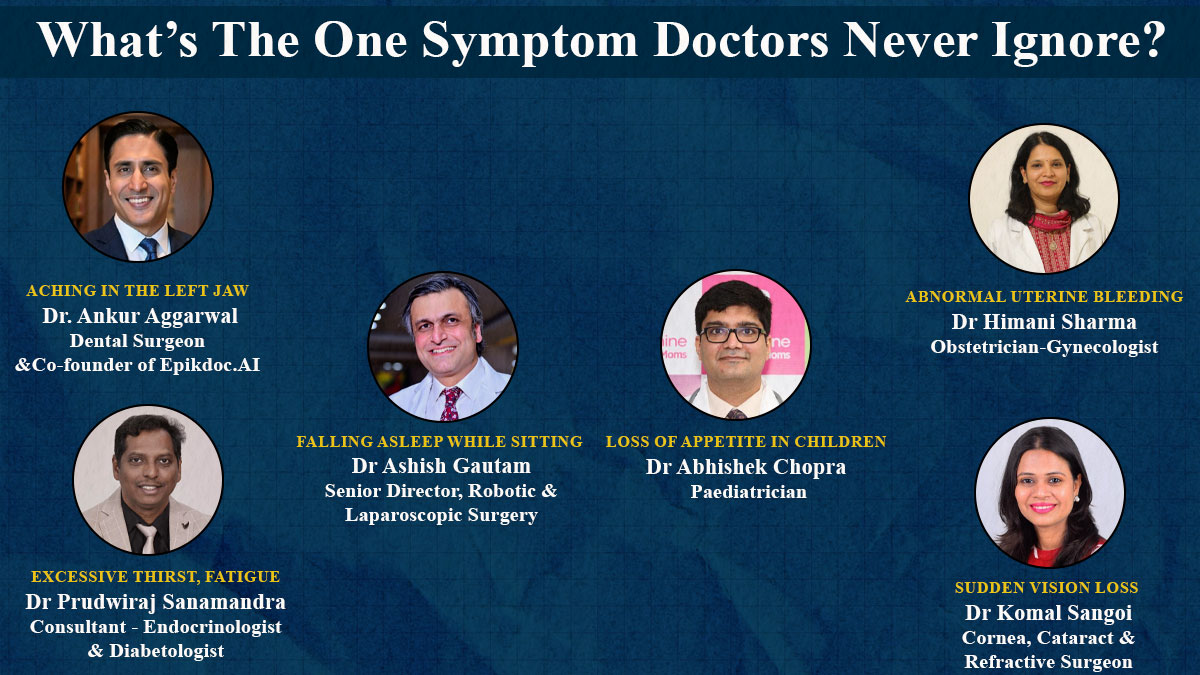
We don’t always collapse before something’s wrong. Illness rarely arrives with a grand announcement. It starts quietly, with strange fatigue, a little pain that overstays its welcome, or a shadow over your mood that won’t lift. Most of us brush these signs off. Too busy. Too tired. Too used to discomfort. But to a doctor’s eye, even the mildest symptom can hold deeper meaning, one that, if ignored, could change everything.
Table of Content:-
Unexplained Fatigue: When Your Body's Energy Starts to Starve
Low Mood or Irritability: The Emotional Red Flag Your Heart Feels Too
Sudden Blurring of Vision: When Your Eyes Signal a Bigger Problem
Pain That Doesn’t Respond to Painkillers: More Than Just a Muscle Pull
Falling Asleep While Sitting: The Hidden Danger of Sleep Apnoea
Aching in the Left Jaw: Sometimes It’s the Heart, Not the Teeth
Excessive Thirst, Fatigue, and Frequent Urination: The Dangerous Trio
This National Doctor’s Day, we turned the spotlight onto the doctors themselves. We asked experts from different fields a simple yet revealing question: 'What’s the one symptom you never ignore?'
Their answers weren’t just about medicine; they were about listening. To the body, to the subtle shifts, and to what health means when you strip away the noise.
Here are the quiet signals these doctors pay close attention to, and why you should, too.
What’s The One Symptom Doctors Never Ignore?

Unexplained Fatigue: When Your Body's Energy Starts to Starve
“Fatigue is not just about being tired, it’s the body’s energy economy breaking down.” Dr Ankita Tiwari, Consultant Endocrinologist, Manipal Hospital, Bhubaneshwar.
We all get tired from time to time. But chronic fatigue, even after rest, isn't just tiredness, it's a warning sign. Dr Tiwari reveals how chronic fatigue can be the body's first cry for help in hormonal imbalance, including thyroid dysfunction, adrenal fatigue, or early-stage diabetes. Many patients dismiss it as stress. But in endocrinology, it’s a gateway symptom that demands a closer look.
Disturbed Sleep: The Silent Start of a Mental Storm
“Sleep is often the first place where mental health concerns begin to surface.” Dr Sandeep Vohra - Psychiatrist and Founder, NWNT.AI.
Struggling to sleep through the night? Oversleeping yet waking up tired? Dr Vohra warns that subtle changes in sleep can be the first signs of anxiety, depression, bipolar disorder, and even psychosis. Sleep isn’t just rest; it’s a diagnostic clue and one that deserves more attention than it gets.
Low Mood or Irritability: The Emotional Red Flag Your Heart Feels Too
“Your emotional health can have a direct impact on your heart health.” Dr Swarup Swaraj Pal, Senior Consultant - Cardiovascular and Thoracic Surgeon, Gleneagles Hospitals, Parel, Mumbai.
We rarely link emotions to cardiac risk, but we should. According to Dr Pal, persistent low mood, unexplained anger, or constant irritability are signs of emotional burnout affecting the heart. In the long run, chronic stress can raise blood pressure, disrupt hormones, and cause hypertension and heart disease. He reminds us that mental health is heart health too.
Sudden Blurring of Vision: When Your Eyes Signal a Bigger Problem
“Blurred vision could be your brain, not your eyes, crying for help.” Dr Avinash Kulkarni, Consultant Neurologist, Gleneagles BGS Hospital, Bengaluru.
If your vision suddenly becomes blurry, especially in one eye, it’s not just about needing new glasses. Dr Kulkarni warns that this can be one of the earliest signs of neurological disorders, including optic neuritis, stroke, or multiple sclerosis. Even fleeting vision shifts, in combination with headache or dizziness, should be addressed correctly. In neurology, vision is the initial symptom before any serious issues arise.

Pain That Doesn’t Respond to Painkillers: More Than Just a Muscle Pull
“Persistent pain can be a whisper of something serious underneath.” Dr Ajay Kumar Paruchuri, Senior Consultant – Orthopaedics, CARE Hospitals, Banjara Hills, Hyderabad.
Pain is the body’s most basic warning system. But what happens when it doesn’t stop? Dr Paruchuri shares that pain that remains even after medication may be indicative of structural damage, occult fractures, or nerve compression. Ignoring it doesn’t make it go away; it delays healing, sometimes until it's too late. If pain lingers, it’s time for a thorough checkup.
Unintentional Weight Loss: A Hidden Sign of Diabetes
“When the body breaks down muscle for fuel, it's already crying out.” Dr Archana Batra, Dietician and Certified Diabetes Educator, Gurugram.
Losing weight without trying may sound like a dream to some, but medically, it's a severe warning sign. Dr Batra clarifies that in diabetes, the body tends to begin burning fat and muscle for fuel since sugar cannot reach cells. It causes sudden weight loss, even with routine eating. It is often one of the first signs that blood sugar regulation is off.
Hair Loss: More Than Just a Cosmetic Concern
“Hair fall is often the body’s first whisper that something’s off.” Dr Vidushi Jain, Dermatologist and Medical Head at Dermalinks in Noida and Ghaziabad.
Hair strands in the shower may go unnoticed, but they should not. According to Dr Jain, sudden or excessive hair fall is usually an early indicator of nutritional deficiency, hormonal imbalance, stress, or some internal problem. It's not about hair, it's about what your body is communicating to you through hair.
Falling Asleep While Sitting: The Hidden Danger of Sleep Apnoea
“It’s not just fatigue, it’s a potentially life-threatening airway issue.” Dr Ashish Gautam, Senior Director, Robotic and Laparoscopic Surgery, Max Super Speciality Hospital, Patparganj, New Delhi.
If someone frequently nods off while sitting or during the day, especially if they’re obese, it could be more than exhaustion. Dr Gautam shares that this is often a sign of Obstructive Sleep Apnoea (OSA), a sleep-disrupting condition that may eventually cause heart failure, arrhythmias, and stroke. If it goes untreated, OSA turns fatal.
Aching in the Left Jaw: Sometimes It’s the Heart, Not the Teeth
“What looks like a dental issue might be an early warning sign of a heart attack.” Dr Ankur Aggarwal, Dental Surgeon and Co-founder, Epikdoc.AI.
Not all jaw pain is about cavities. Dr Aggarwal illustrates how pain in the lower left jaw, particularly without seeming dental causes, can sometimes be a sign of cardiac distress. It's a symptom more common in women, and when misread or ignored delays life-saving intervention.

Abnormal Uterine Bleeding: When Periods Tell a Bigger Story
“Women often delay help, but early detection can save lives.” Dr Himani Sharma, Clinical Head and Senior Consultant, Department of Obstetrics and Gynaecology, Cocoon Hospital, Jaipur.
Bleeding between periods, unusually heavy flow, or any bleeding after menopause shouldn't be normalised. Dr Sharma points out how such symptoms can indicate fibroids, hormonal problems, or even endometrial cancer. Unfortunately, stigma prevents many women from getting care in time. However, early detection of these signs can significantly change the course of events.
Excessive Thirst, Fatigue, and Frequent Urination: The Dangerous Trio
“When these three appear together, it’s often diabetes knocking.” Dr Prudwiraj Sanamandra, Consultant - Endocrinologist and Diabetologist, Arete Hospitals, Hyderabad.
Thirst that doesn’t go away. Fatigue that doesn’t fade. Frequent bathroom visits disrupt life. These aren’t just quirks, they’re warning bells. Dr Sanamandra explains how this symptom trio tends to indicate type 2 diabetes in its initial stages. The earlier it is detected, the easier it is to manage.
Loss of Appetite in Children: Not Just a Phase
“Sometimes, poor appetite in kids is the first sign of iron deficiency.” Abhishek Chopra, Senior Consultant Neonatologist and Paediatrician, Cloudnine Group of Hospitals, New Delhi, Punjabi Bagh.
Children being fussy eaters isn’t new, but when a child consistently avoids meals or shows no interest in food, Dr Chopra says it shouldn’t be ignored. Often, this points to anaemia (low haemoglobin), which affects energy, concentration, and growth. Once treated with iron supplementation, many children show a dramatic improvement in appetite and overall well-being.
Sudden Vision Loss: A Blink Can Signal Much More
“Even brief or one-eye vision loss could mean retinal detachment or stroke.” Dr Komal Sangoi, Cornea, Cataract and Refractive Surgeon, Wockhardt Hospitals, Mumbai Central.
A vision that dims suddenly, even if it returns or affects just one eye, should never be ignored. According to Dr Sangoi, it could indicate serious conditions like retinal detachment, optic neuritis, or even stroke. In others, it is a sign of an underlying disease, such as poorly managed diabetes, hypertension, or autoimmune illness. A shadowy curtain, blinding flashes of light, or acute floaters can appear insignificant but can result in irreversible vision loss if treated belatedly. The eyes, after all, often speak before the rest of the body does.
Bottomline
Doctors see what most of us miss, not just in test results or X-rays, but in the small shifts, the subtle cues, the whispered warnings our bodies give. These aren’t just symptoms, they’re stories. And this Doctor’s Day, those who heal us are asking us for just one thing: to listen to ourselves a little more. Because sometimes, noticing a symptom isn't overreacting, it's the first step to saving your life.
How we keep this article up to date:
We work with experts and keep a close eye on the latest in health and wellness. Whenever there is a new research or helpful information, we update our articles with accurate and useful advice.
Current Version
